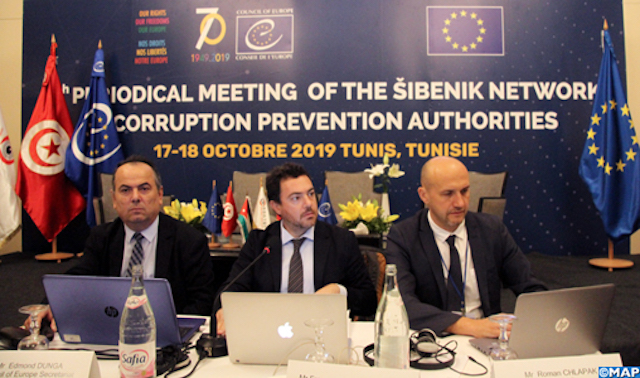Updated
Morocco and the Complexity of Development – Jean R. AbiNader

Morocco participates in the 4th Meeting of the Council of Europe Šibenik Network of Corruption Prevention Agencies iwith representatives of anti-corruption and prevention agencies from 15 countries in Tunis on October 2019 Photo: MAPEXPRESS
Jean R. AbiNader
December 18, 2019

Jean R. AbiNader, Moroccan American Center
Analysts opine that Morocco is at a crossroads, but it’s not clear whether that captures the implications of future choices accurately since it implies at least four choices. In a recent news report, multiple issues emerged in a single complaint towards Minister of Agriculture and billionaire Aziz Akhannouch, lodged by the former head of government and leader of the Justice and Development Party (PJD) Abdelilah Benkirane. Akhannouch, who is also the head of the National Rally of Independents party (RNI), had said that Moroccans should “discipline” people who lack respect for the Moroccan state and its institutions. “Justice is not the [only institution] that has to do its job, Moroccans should also do their job.”
Among a number of public reactions, Benkirane had retorted, “When Moroccans say discipline, they are talking about punishment. And justice is the only institution to punish people if someone violates the law. It is not your business to discipline anyone.” The subtext to this story involves perceptions of wealth inequality, the power of those close to King Mohammed VI, and the perceived conflict between institutional and individual power in a country where personal status still has great influence.
Benkirane also pointed out that in Morocco “our state is 100% a monarchy,” and that “Defending the monarchy is not one individual’s role, it is the role of all Moroccans, who believe in monarchy.”
All of this is part of the drama in the rollup to the next set of parliamentary elections in 2020 and provides some insight into potential issues as RNI seeks to build its credibility as a worthy challenger to the PJD’s current leadership. There are red lines that won’t be crossed, that is, criticizing the King, Islam, and Morocco’s territorial integrity; but there plenty of other issues according to Transparency International’s “Corruption in the Middle East and North Africa: regional trends from the 2019 Global Corruption Barometer.” The study surveyed Jordan, Lebanon, Morocco, Sudan, Tunisia, and Palestine, with interviews with 1,200 Moroccans in the summer of 2018.
Despite the efforts to empower anticorruption bodies as part of the 2011-2012 reforms, enforcement still lags. “A challenge in Morocco is the perception that positions of power and public service are mainly used for personal enrichment,” concludes the report. More than half of the respondents (53%) said that the corruption level had increased in the previous 12 months, with 31% saying that they had to pay a bribe, most often (32%) to secure hospital services. Regarding government, 74% think it is doing a bad job of tackling corruption, and 49% think that ordinary citizens can make a difference in the fight against corruption.
The report also indicates that Morocco’s reported bribery rate has gone down since 2015 by 17%, which may be a testament to growing effectiveness of government efforts as respondents rated corruption in the police at 24% and judges and magistrates at 26%, while the offices of the prime minister (39%), members of Parliament (41%), and government officials (37%) did not fare as well.
So looking to the 2020 elections, there is a question whether corruption and the effectiveness of government institutions will be one of the key issues addressed. It would seem that the demonstrations that have occurred over the past three years, which reflect unhappiness with economic conditions, lack of jobs, inefficient government services, abuses of human rights, and the lack of an independent judiciary are high on the peoples’ agenda. Whether or not this translates into electoral politics will be a story worth watching.